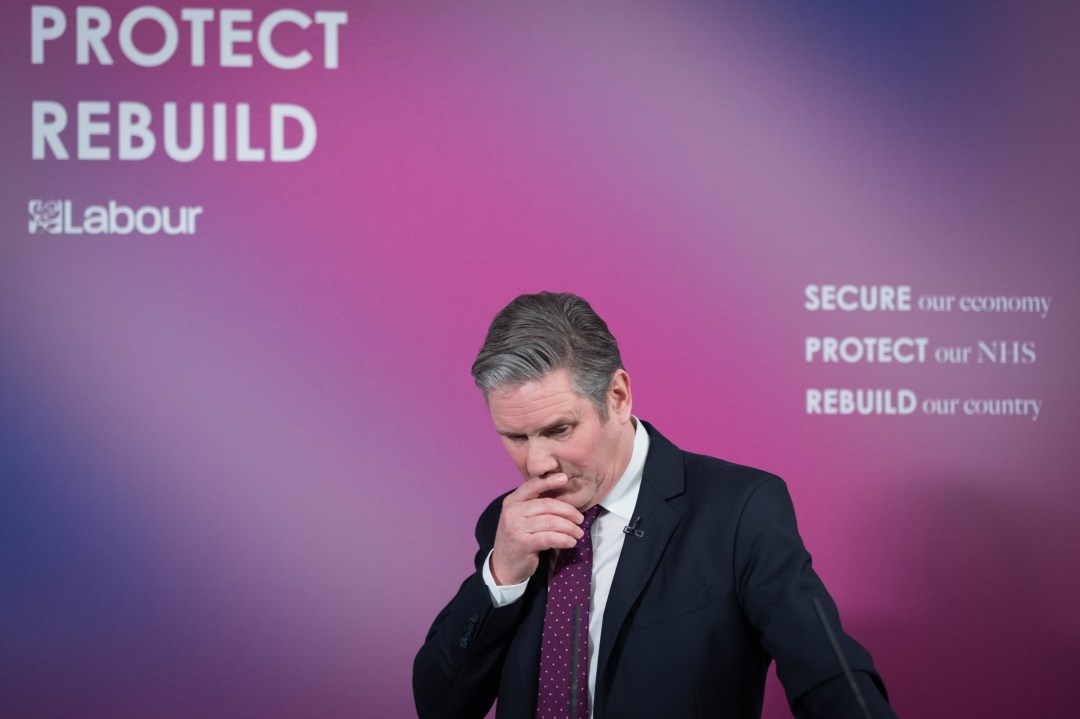Keir Starmer’s speech on economic recovery, delivered at Labour’s Southside HQ on Thursday, was hyped as one of the most pivotal moments of his leadership so far. A Labour insider told Politico it had been ‘six months in the making with a huge amount of work going into it’. It was designed to establish a clear ‘fork in the road’ between the Conservatives’ and Labour’s economic visions, both in the short term — leading up to the Budget next month — but also in the future, as Starmer pledged to shape the economy ‘to look utterly unlike the past’.
But for a speech that was supposedly months in the making, there was surprisingly little substance. Starmer’s main proposals for an alternative Budget were pledges to extend support schemes already brought in by the government to assist with relief, including the uplift to Universal Credit and the extension of free school meals. His ‘different path’ for pandemic recovery mirrored key aspects of Chancellor Rishi Sunak’s outlook, including timelines for restoring sustainable public finances and pushing back on tax rises that would stall economic recovery.
His proposals for improving employment levels also represented tweaks rather than an overhaul. He pledged to extend furlough and boost the government’s Kickstart Scheme, making no mention of potential tax breaks for employers to encourage them to hire, or plans to address the huge shift that’s taken place over the past year, including flexible hiring practices and working from home.
His ‘different path’ for pandemic recovery mirrored key aspects of Chancellor Rishi Sunak’s outlook
The only major new economic proposal put forward by the Labour leader was the establishment of ‘British Recovery Bonds’ to bolster the government’s access to financing — which would suggest he has fundamentally misjudged the risks Britain is currently facing.
Recovery bonds are issued by governments in times of crisis, when the state is struggling to borrow money. They are promoted with emotional appeal, as the rate of return is often low: investors buy at a ‘patriotic price’ to help keep the public finances afloat. Yet if you were to make a list of the top 100 problems currently facing Britain right now, an inability to borrow wouldn’t make the cut.
Between the magic money tree in the garden of the Bank of England — which has increased the size of its bond-buying programme to £875 billion — and spooked investors looking for safe investments, the Treasury has no problem financing its spending habits. Nor does it fear being cut off any time soon, with the Bank’s deputy governor just yesterday discussing the scope for more QE.
It would seem, at the moment, the government has an infinite amount to spend, which has been confirmed by its willingness to do so. No expense has been spared to tackle the Covid pandemic (the deficit for this financial year is estimated to be nearly £400 billion) nor does any trade-off seem to have been made to balance out the emergency measures: the government is still buying bankrupt satellite companies and building a £100 billion high speed train line that was thought to be out of date even before the pandemic hit.
Starmer didn’t lay out any particulars for these bonds — just that they would be a pot the government could draw on for local investments. But barriers to investment aren’t what weighs on Sunak’s mind: what does is the ramifications of all this easy money. With the major levers of the Bank already pulled, the UK is in danger of losing its resilience — not just to major economic shocks, but modest moves in interest rates or inflation that in normal times would still be considered small. The country’s vulnerability isn’t that it can’t rack up debt — it’s that servicing the debt could become significantly more expensive in the years ahead.
Starmer’s shadow chancellor Anneliese Dodds understands this. In an unlikely pairing, both Dodds and Sunak have become some of the lone voices for fiscal responsibility in recent months, with Dodds warning against the mounting belief that ultra-low interest rates are here to stay. She has been promoting Labour’s economic strategy as one that would make the ‘prudent’ case for spending, positioning herself and her party in a place to say ‘I told you so’ if things go wrong.
Starmer speech undermined those efforts, and with little to show for it. He was already caught between a rock and a hard place going into this speech: needing to distinguish his party as the more generous spender, while also needing to modify his position from Jeremy Corbyn’s Labour party, which threw all notion of balanced budgets out the window. The result was rhetoric that was heavy on change, but his promise of a modern ‘Beveridge Report’ fell very short, with crucial questions about Labour’s future relationships with taxpayers, employees and business owners left unanswered.








Comments